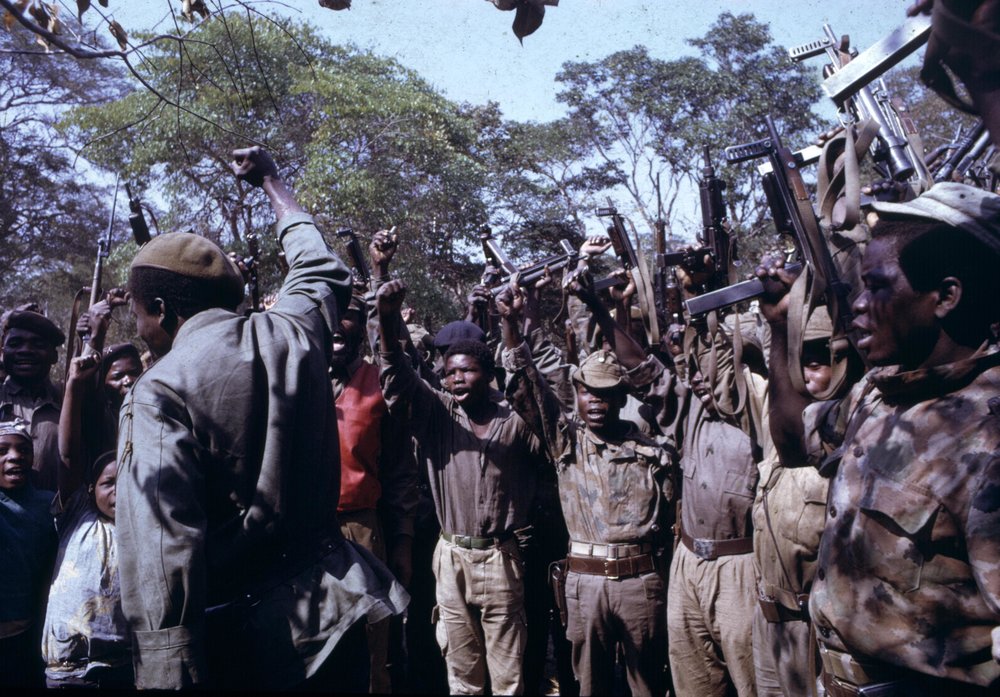
Olivier Hadouchi, Towards an Aesthetics of Southern Uprisings
5 April 2019, Museum of Contemporary Art Metelkova, Ljubljana. The lecture Towards an Aesthetics of Southern Uprisings by a curator and film theorist Olivier Hadouchi accompanies the Southern Constellations: The Poetics of the Non-Aligned exhibition.
Reporters from former Yugoslavia like Zdravko Pečar and Stevan Labudović documented the Algerian War of Independence; their country was part of the Non-Aligned Movement, promoting anti-colonialism and the right to national independence, and they had links with many nations (and sometimes liberation movements) in the South (Asia, Africa and Latin America). In addition to being reporters, they had first-hand experience of the partisan struggle, as did the British historian Basil Davidson, who supported the struggles of Angola and Guinea Bissau for independence and had been stationed among the Partisans in Yugoslavia in World War II.
The Tricontinental Movement, drawing inspiration from the ideas of Frantz Fanon (The Wretched of the Earth, 1961), Amílcar Cabral, Ho Chi Minh and Ernesto Che Guevara (with his famous Message to the Tricontinental “create two, three… many Vietnams” published in 1967), was (or is now considered) a revolutionary constellation in the South in the period of decolonization in Asia and Africa, and of anti-imperialist struggles in Latin America. While it is generally seen as more radical than the Non-Aligned Movement, both movements used images of partisans (guerrilleros, guerrilla fighters in their element and in a natural environment) and shared other elements (people in arms) in their representations of the struggles in the South. The Tricontinental Movement is now seen by artists and filmmakers as a revolution in both politics and aesthetics.
The First Tricontinental Conference was held in Havana in January 1966, where a new organization called OSPAAAL (the Organization of Solidarity with the People of Africa, Asia and Latin America) was set up to build relations of solidarity between the countries and revolutionary movements of the three Third World continents flying the flag of internationalism. In the words of Mehdi Ben Barka, chairman of the Tricontinental preparatory commission, it sought to bring together “the two biggest contemporary movements from the World Revolution: the Socialist and the National Liberation movements.”
After the First Conference, the Tricontinental magazine was published on a regular basis in different languages under the artistic direction of Alfredo G. Rostgaard. Each issue contained a folded poster (sometimes very colorful and powerful, an aesthetic still very influential today) and several graphic interventions; the posters were used as an agitprop tool and a symbolic weapon. Some OSPAAAL films were produced as well, such as Santiago Álvarez’s or José Massip’s Cuban and internationalist documentaries, establishing a kind of Tricontinental aesthetic, while Che Guevara’s call for southern and internationalist struggle influenced various filmmakers all over the world (from Jean-Luc Godard to Fernando Solanas) as an open invitation to radical politics and formal invention.
Olivier Hadouchi was born, lives and works in Paris. He holds a PhD in cinema studies and is a film curator and researcher (associated with IRCAV - Paris 3). Hadouchi published a booklet about solidarity with the Algerian war of independence (edited by Zoran Erić & MoCab) and an essay about Kinji Fukasaku. He wrote several texts for collective books, including the catalogue of Chris Marker's. L'homme-monde (ed. and curated by Christine Van Assche, Raymond Bellour and Jean-Michel Frodon), and publications such as Third Text, CinémAction, Mondes du Cinéma, La furia Umana, SWAG. Hadouchi has curated film programs about “Tricontinental”, “68 (re)Extended”, “Sparkles & Tropical Insurrections” for The Mosaic Rooms (London) Amiens International Film Festival, Museum Reina Sofía (Madrid), Bétonsalon, le BAL (Paris), ZdB (Lisbon), Bandits-Mages (Bourges), and had lectures at Slovenska Kinoteka (Ljubljana), Hangar (Lisbon), Mama (Algiers), MoCab (Belgrade), Tranzit (Prague), Viña del Mar (Chile), Laboratoires d'Aubervilliers, INHA (Paris).